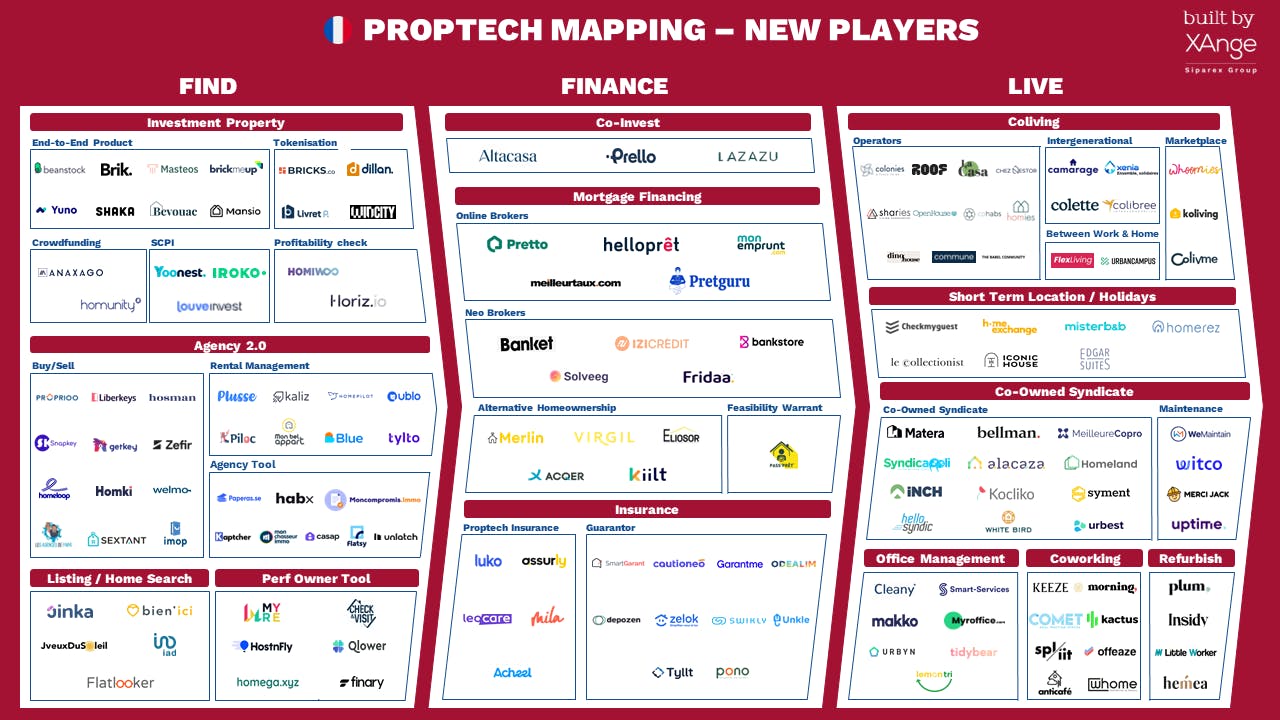Property technology (also called proptech and real estate technology) has radically changed our way to rent, buy, and sell commercial and residential properties. The past year saw rapid adoption of proptech by prominent real estate agencies and even by independent realtors, property managers, and brokers.

All told, venture-backed companies in the real estate and property tech space raised nearly $21 billion in 2021. We built this mapping to identify emerging trends in proptech through the lenses of category defining early-stage startups.
In the proptech industry, some sectors have seen a rapid transformation while others didn’t evolve much. Among the verticals that have not changed much, we have noticed: tools for agencies (3D visit, visit management), crowdfunding (which was rather a trend in 2016), and the construction part (not detailed here), which has not seen any major change in the last two years.
On the other hand, we’ve seen major changes in interior design (Plum, Héméa), insurance (Luko’s acquisition of Unkle), guarantors, and property management (waste sorting, cleaning, unions). The industry is quite broad. We have decided to focus on what we think are two of the most interesting areas :
Co-living : the end of urban loneliness
Following Covid-19 crisis, many households felt a deep need for change and co-living has raised as a popular solution to fight against professional isolation. Halfway between coworking and flat sharing, the “co-living” concept, which arrived in France a few years ago, offers individuals the opportunity to live in a large flat with qualitative and spacious shared spaces. An external operator manages and runs the space, and offers premium services, that are mostly included in the rent.
At XAnge we have made this bet by investing in Roof, the shared flat service for students.
This need for flexibility among young people is also found in the workplace: coworking. More and more companies are experiencing “flex-office”, with employees only coming to the office a few days per week. We also have the “fully-remote employees” who became “digital nomads” and this dispels the need to live in the heart of the city. We are totally changing the way we consume housing. We are entering a period where consumer habits are evolving faster than the capacity of buildings to change, and this is creating a lot of opportunities for start-ups. In fact, the startups are the ones who enforce their solutions while lessors are less and less relevant for customers.
Making real estate accessible to all
The other trend we would like to focus on is the rise of turnkey rentalinvestment companies: Masteos, Beanstock, Brik… These companies take away a huge pain: dealing with the boring and time-consuming tasks of visiting, hunting and renovating flats. It is difficult to establish a clear winner in this category, so we tried to look at these players through the prism of their fundraising (blue for Series A and red for Seed). It makes it easier to visualize those who are starting to establish themselves in the sector (Beanstock and Masteos) and the newcomers (Mansio, Brik, Bevouac…).
A new model for real estate investment has also emerged: tokenisation. It allows people to invest in real estate with as little as 10€. This is what companies such asBricks.coare offering.
Startups are democratizing an asset that was previously inaccessible. Property investment is the favorite investment of French people, far ahead of the stock market. 56% of them think that rental property is the best way to invest. For example, Zefir, funded by Sequoia, is revolutionizing the sale of property by buying it back at lightning speed. Previously, it took an average of 100 days to sell a property.
There also seems to be a revolution in the old format of SCPIs (société civile de placement immobilier), a collective investment vehicle that collects funds contributed by individual investors in order to acquire and manage aproperty portfolio. In return for this investment, the investors receive shares. Some start-ups such as Louve or Iroko are refreshing this asset class to make it attractive to a younger population.
Thus, innovations in PropTech have revolutionized the way we live and invest in real estate. What are the next innovations to expect in this sector? How will the metaverse take over real estate? After the three big natural chapters of crypto: luxury, gaming and the arts, right behind comes PropTech. Like luxury items, it is possible to attach certificates, such as the purchase of a hotel property divided into tokens. The token contains all the transfer rules to certify the ownership of the asset. This is the kind of innovation that will simplify and reduce the costs of legal contracts.



